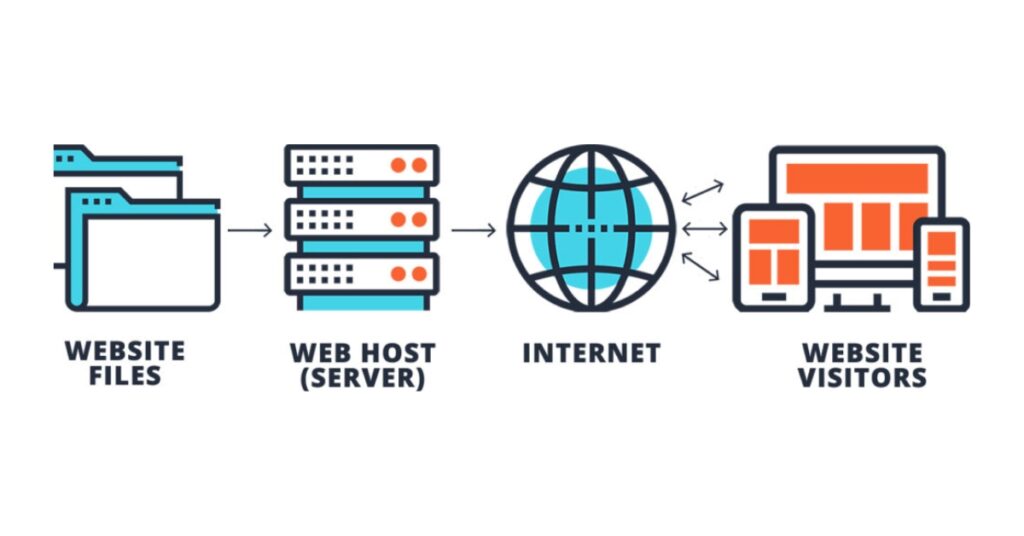Web hosting is a service that allows individuals and organizations to make their websites accessible on the internet. It involves storing website files, databases, and other necessary data on a server connected to the internet. When a user types in your website’s domain name, their browser connects to the server, retrieves the files, and displays the website content.
Types Of Web Hosting

There are several types of web hosting available, each with its own pros and cons. Some of the most common types include:
- Shared Hosting: This is the most basic type of hosting, where multiple websites share a single server. It is affordable and easy to set up, but it can be slow and less secure.
- VPS Hosting: Virtual Private Server (VPS) hosting is a step up from shared hosting, where multiple websites share a single server, but each website has its own virtual server. It is more secure and customizable than shared hosting, but it can be more expensive.
- Dedicated Hosting: With dedicated hosting, you have an entire server to yourself, giving you complete control over its configuration and performance. It is the most secure and customizable option, but it can be expensive.
- WordPress Hosting: WordPress hosting is a type of hosting where the provider takes care of all the technical aspects of hosting, such as server maintenance, security, and backups. It is more expensive than other hosting options, but it can save you time and effort.
How Web Hosting Works Explained Step-By-Step

Web hosting is a service that enables you to publish your website or web application on the internet.
Here is a step-by-step breakdown of how web hosting works:
- Purchase a hosting plan: When you sign up for a web hosting service, you are essentially renting space on a physical server to store all your website’s files and data. Web hosts provide the hosting technology and resources required for the effective and secure operation of your website.
- Upload your website files: Once you have purchased a hosting plan, you need to upload your website files to the server. This can be done using an FTP client or through the web host’s control panel.
- Domain name registration: You need to register a domain name for your website, which is the address that people will use to access your site. This can be done through your web host or a separate domain registrar.
- Accessing your website: When someone enters your website’s URL into their browser’s address bar, their computer connects to the server on which your website is hosted. The server then transfers your website’s files to their computer or mobile device, and their web browser converts these files into the web pages they see.
Web hosting involves renting space on a physical server to store your website’s files and data and making them available to users who access your website through the internet.
Pros Of Web Hosting
- Reliable Performance and Uptime: One of the significant advantages of web hosting is the assurance of reliable performance and uptime. Professional web hosting providers offer robust infrastructure and advanced technologies to ensure your website is accessible to visitors around the clock. With reliable hosting, you can minimize downtime and provide a smooth user experience.
- Scalability and Flexibility: Web hosting allows you to have complete control over your website’s customization and configuration. You have the freedom to choose the software, applications, and scripts that best suit your business needs. This level of customization ensures that your website reflects your brand identity and provides a unique user experience.
- Affordable Hosting Plans: The web server industry is a competitive industry, and beginners can get some incredible deals. Hosting providers can offer stronger security, extra features, faster performance, better support, and design tools to attract customers. Web server companies have been innovating and expanding affordable product portfolios that are required to gain traction and survive in the industry, and this is good for customers and their businesses.
Cons Of Web Hosting
- Cost Considerations: Choosing the right web hosting solution is essential for your business’s success. Understanding the pros and cons of different hosting options can help you make an informed decision. Remember to consider factors such as reliability, performance, support, security, scalability, and cost. By assessing your needs and budget, you can choose the right hosting plan that meets your requirements.
- Lack of Control: When you use web hosting services, you are entrusting your website to a third-party provider. This means that you have limited control over the server and its configuration. If the provider experiences technical difficulties or goes out of business, your website may be affected.
- Security Risks: Web hosting services can be vulnerable to security breaches, which can compromise your website’s data and functionality. It is essential to choose a reputable hosting provider that offers robust security measures, such as firewalls, malware detection, and data encryption.
The Best Web Hosting Platforms In 2023
Bluehost, Hostinger, and GoDaddy will all be popular web hosting platforms in 2023. Here is a breakdown of each platform:
Bluehost

- Bluehost is a popular web hosting platform that has been recommended by WordPress since 2005.
- It offers a WordPress-centric dashboard, free WordPress site migration, and a WordPress staging environment.
- Bluehost has a dedicated team of WordPress experts who can help users select themes, install plugins, and answer any questions with its 24/7 support.
- It is a great option for WordPress users, as it allows for an easy and quick installation process.
- Bluehost offers a wide range of services, ranging from basic shared hosting up to virtual private servers and dedicated machines.
Hostinger

- Hostinger is a web hosting platform that offers affordable hosting plans.
- It offers a user-friendly interface and a drag-and-drop website builder.
- Hostinger has a 99.9% uptime guarantee and provides 24/7 customer support.
- It is a great option for those who are just starting out with their website and want an affordable hosting plan.
GoDaddy

- GoDaddy is a well-known web hosting platform that is easy to use.
- It offers a wide range of services, including website builders, domain registration, and email hosting.
- GoDaddy has a user-friendly interface and provides 24/7 customer support.
- It is a great option for those who are new to web hosting and want an easy-to-use platform.
Read more tech blogs on our website visit GivemeVPN.
Conclusion
Web hosting is an essential service for anyone who wants to create a website. It allows you to make your website accessible to visitors around the world and provides you with the tools and resources you need to customize and manage your site. However, it is important to understand the pros and cons of different hosting options and choose the right plan that meets your needs and budget. By doing so, you can ensure that your website is reliable, secure, and accessible to your target audience.
For more such blogs visit GivemeVPN.

